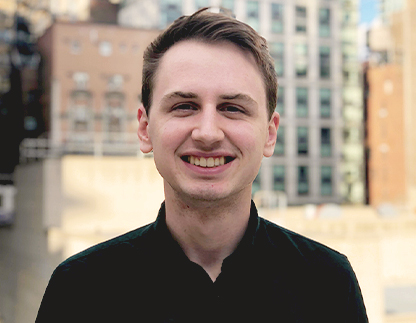There is so much to gain from getting to know people in your field, and people outside academia whose work intersects with the topics you study.”
John Branch (he/him)
PhD Candidate in the Department of History

John Miles Branch is a PhD candidate in the Department of History in the Weinberg College of Arts and Sciences. His research is focused on nonprofits and philanthropy, and his dissertation analyzes the growing prominence of the nonprofit sector in the American economy during the second half of the twentieth century. John has worked as a fellow with the Chabraja Center for Historical Studies and the NU Chicago Humanities Initiative (CHI), and is a Mellon Cluster Fellowship recipient in Science Studies.
How would you describe your research and/or work to a non-academic audience?
I study the history of the American nonprofit sector. This is a sprawling, diverse group of institutions that most of us interact with frequently, encompassing everything from a small community health clinic to the Ford Foundation to Northwestern University itself. About one in every ten American workers is employed at a nonprofit, but it’s a pretty recent conceptual construct: Americans have only really been talked about the “nonprofit sector” as a category of the American economy since the 1970s.
My dissertation looks at different people’s understandings of the role that this group of institutions played in a capitalist economy and what kinds of relationships it ought to have to the market and the state, and how they evolved during the second half of the twentieth century.
Tell us what inspired your research and/or work.
I worked after college for a couple of different nonprofit organizations. During that time, I was really interested in understanding the structures of the economy, but I found that often the models people had for thinking about it assumed a "mixed economy" of public and private sector alone. I wanted to reach a better understanding of how this group of institutions that’s often considered exceptional in various ways had been understood in relation to the economy as a whole, and the rest is history.
Whom do you admire in your field and otherwise, and why?
Dino Robinson, the founder of Shorefront Legacy Center. Shorefront is an archive based in Evanston that documents African American history in Chicago’s North Shore suburbs where I’ve been fortunate to do some work over the last two summers. Over two-plus decades, Dino has patiently worked to build a remarkable set of collections. The thing I admire the most about him is how he cultivates authentic, long-term relationships with the people and institutions whose records are housed at Shorefront. It’s easy to think of an archive as a static place where old stuff just ends up. Watching how Dino weighs complex questions of archival preservation together with so many community members, you realize how much more there is to it.
What do you find both rewarding and challenging about your research and/or work?
My dissertation project has a big scope: I'm investigating a question at the national scale and trying to bring together bits and pieces of archival evidence from a lot of places. This is a really exciting dimension of the project for me, but it also comes with challenges—practical ones like having to figure out which research trips to prioritize given time and funding constraints, and intellectual ones like how to weave the thoughts and actions of a diverse set of characters who often weren't interacting with one another directly into a thematically cohesive whole.
How do you unwind after a long day?
I bike along the lakefront trail, watch baseball, and get a big, iced coffee or a beer at Simon's Tavern.
What books are on your bedside table?
One is Last Call at the Imperial Hotel, the fascinating group biography of American journalists in interwar Europe by my history department colleague Deborah Cohen.
Another is Crook Manifesto, the latest in Colson Whitehead’s Harlem-based family saga. I'll read pretty much anything that has to do with 1970s New York.
Finally, I’ve been slowly making my way through The Dawn of Everything by David Wengrow and the late David Graeber, for two years now. Hopefully soon I’ll be able to tell you why we’re all like this.
What advice would you give your younger self or someone considering a similar path?
History allows you to get by with a more solitary approach than many academic disciplines, but you can miss a lot that way. There is so much to gain from getting to know people in your field, and people outside academia whose work intersects with the topics you study. I'm a pretty shy person by nature, but the good news is, I’ve found this is a skill I can build and it’s never too late to do it.
Tell us about a current achievement or something you're working on that excites you.
There's a chapter in my planned dissertation where I want to compare how labor and management at nonprofit organizations experienced the economic downturn of the early 1980s. Until recently, I didn't know exactly where the archival evidence in this section would come from, but this month, I learned that I won a pair of small travel grants: one to visit a labor union archive and another to visit a business school archive. Planning a dissertation can feel like an exercise in abstractions and it's exciting to see the project a step closer to realization.
Publish Date: May 14, 2024
If you know a graduate student, postdoctoral scholar, graduate faculty member, staff member, or a member of our TGS alumni population who would make a great candidate for our TGS Spotlight Series, please complete this brief TGS Spotlight Series Nomination Form.